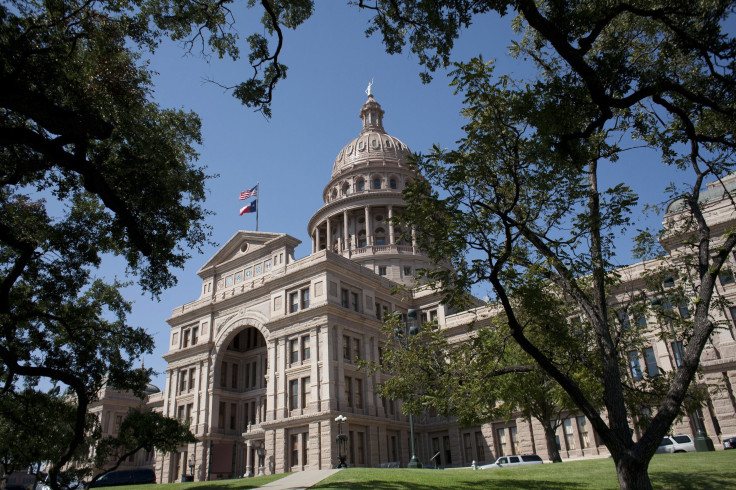Muslim Activists Cite Growing Islamophobia After Texas Anti-Islam Protest

Texas Muslim Capitol Day on Thursday attracted protesters condemning Islam as well as one state representative who called for Muslims to submit to a loyalty oath. That prompted Muslim civil rights activists to say Friday that their resolve to address anti-Muslim hatred has only been strengthened. The backlash against the event in Austin, Texas, represents the growing Islamophobic sentiment within American society and particularly among elected officials, activists said.
Despite the initial shock of witnessing two dozen protesters yelling anti-Muslim comments at the event's speakers the experience was ultimately motivating, said Ruth Nasrullah of the Houston chapter of the Muslim advocacy group the Council on American-Islamic Relations (CAIR). “It made it clear how much we have to support civil rights and the fight against Islamophobia,” she told International Business Times on Friday.
The Texas Muslim community’s annual political outreach event has taken place every year since 2003 with the intention of encouraging more Muslims to participate in the democratic process. Houston is thought to have the third-largest Muslim population in the U.S., said Nasrullah, who pointed out that this year’s rally was the first to attract protests. As members of Texas’ Muslim community gathered on the Capitol’s steps, demonstrators surrounded the rally, waving signs proclaiming “Go home and take Obama with you,” “Muhammad is Dead” and “No Sharia, Go home.” One protester rushed the podium to scream condemnation of Islam before being escorted away by Texas Department of Public Safety troopers who were out in force to prevent violence, reported USA Today.
Ahead of the event, Texas State Representative Molly White ignited a social media controversy by posting on her Facebook page that the Muslim participants at the event should renounce Islamic terrorist groups and publicly announce allegiance to the U.S. The post prompted CAIR to request an ethics ruling from the Texas House of Representatives, which issued a statement saying, “Legislators have a responsibility to treat all visitors just as we expect to be treated -- with dignity and respect.”
While White’s call was unlikely a genuine attempt to force Muslims to swear loyalty oaths, the fact that the state representative thought her sentiments were acceptable to express in a public forum points to one of the bigger problems faced by the Muslim community, said Ibrahim Hooper, CAIR’s national communications director. “She thought it was okay to say this and that she wouldn't get any pushback. And in some circles she's probably hero,” he said. “The issue is, unfortunately, there's a growing anti-Muslim sentiment in our society.”
Hooper tied a recent spike in this sentiment to the aftermath of the attacks by Islamist extremists on the Paris offices of French satirical magazine Charlie Hebdo, which he said has prompted “anti-Muslim hysteria.” While this response was most obvious across Europe, he said that his organization is dealing with similar issues in the U.S., including a threat of violence against its San Diego offices by a local man, whom police arrested Friday.
Louisiana Gov. Bobby Jindal is one of the more prominent American politicians to give voice to remarks that have been seen as anti-Muslim in the wake of the Paris attacks. The Republican politician made headlines for his claim that certain areas around Europe have become “no-go zones” where non-Muslims are not allowed. In a speech on Jan. 19, Jindal warned of “dangerous” Muslims "who want to come to our country but not adopt our values," according to a report by Vox on anti-Muslim rhetoric among GOP politicians.
As disturbing as some of this rhetoric has been for Muslim communities, the bigger concern for activists is the spate of “anti-Sharia” legislation sweeping statehouses around the country, said Nasrullah, who argued that such efforts singled out Muslims and were “un-American.” A similar proposal is currently under consideration in Texas after Dan Flynn, a Republican state lawmaker, introduced a bill that would prevent courts from considering foreign laws. Though lawmakers have learned to couch their anti-Muslim sentiment in other terms, the intent to target Muslims and essentially make the practice of their faith illegal was “still pretty clear,” according to Nasrullah.
Flynn’s bill was one of the issues that attendees were hoping to address at Thursday’s rally, the largest Texas Muslim Capitol Day thus far, said Nasrullah. However, the underlying theme of the event remained what it has been since it was first instituted, which, Nasrullah argued, was to “get our voices out there, for our community to learn about how government works and how we participate in the democratic process.”
© Copyright IBTimes 2025. All rights reserved.






















